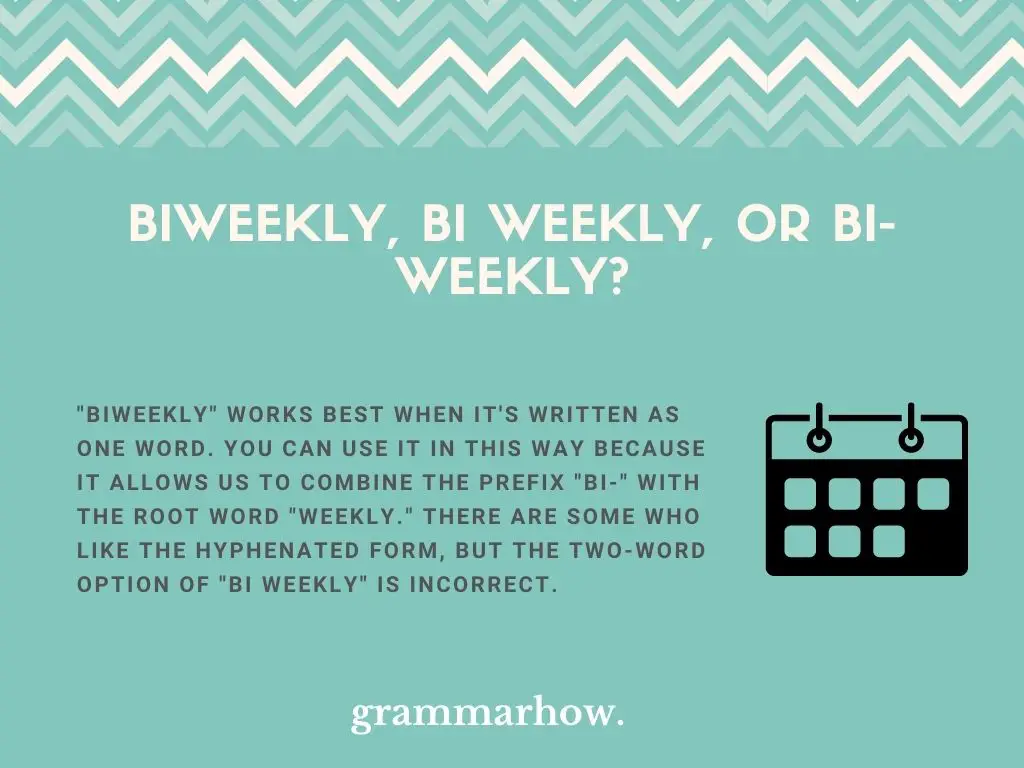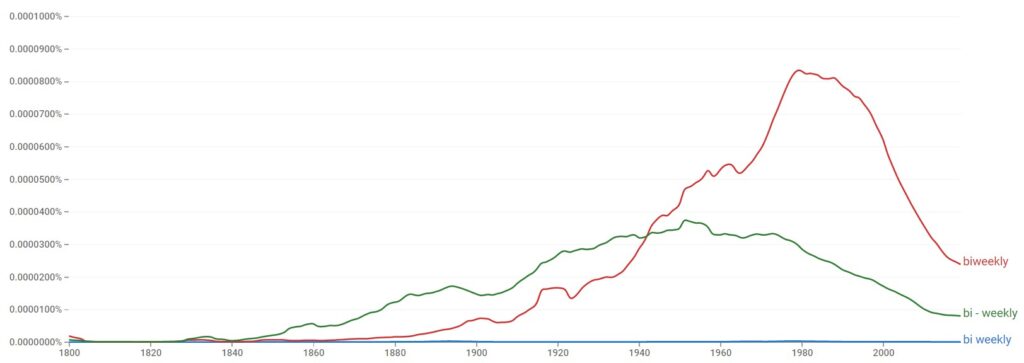Let’s go over how to spell “biweekly” when using it in our writing. Some people get stumped as to whether it’s one or two words. It might even work as a hyphenated form, so this article will look into the answer for you.
Bi weekly vs. Bi-weekly vs. Biweekly
“Biweekly” works best when it’s written as one word. You can use it in this way because it allows us to combine the prefix “bi-” with the root word “weekly.” There are some who like the hyphenated form, but the two-word option of “bi weekly” is incorrect.

According to Google Ngram Viewer, “biweekly” is the most popular choice for native writers. It’s always been the more popular choice in recent decades, but there are some instances where “bi-weekly” is used. The two-word variation, “bi weekly” is never correct.

In The Cambridge Dictionary and The Oxford Dictionary, “biweekly” is the correct variation. It has a definition that states it as a noun and adjective when it is written as one word. There is no need to include the hyphen in either case.
However, The Oxford Dictionary also mentions “bi-weekly” as an alternative, which shows that the hyphenated form does have some correctness to it. It depends on the writer, but for the most part, the hyphenated form is what you should stick to.
Is “Biweekly” One Word?
“Biweekly” works best when written as one word. “Bi-” is a prefix that modifies the root word “weekly” to show that something happens every other week. We do not typically need to include a hyphen after a prefixed form like “bi-.”
To emphasize the point that we’re trying to make, check out these other “bi-” words:
- Bipolar
- Bipedal
- Bisexual
None of them are written with a hyphen, and the same applies to “biweekly.”
Here are a few examples to help you:
- I need the biweeklies on my desk by Monday at the latest.
- What have you heard about the biweekly intake?
- The biweekly meeting is about to take place, and we’re all expected to be there.
- Haven’t you seen enough of the biweeklies to last a life time?
Is “Bi weekly” Two Words?
“Bi weekly” is never correct. “Bi-” is a prefix word, so it needs to be included as part of “weekly” when it’s modifying it to show that something happens once every two weeks. We cannot include a space between the prefix and the root word.
Here are a few examples that should help you to understand it:
- Correct: What is the bi-weekly news going to be about? I haven’t had time to catch up on it.
- Incorrect: The bi weekly articles are ready to go to print now, sir.
- Correct: Have you sorted out the biweeklies for me now?
- Incorrect: We could have done plenty of bi weeklies by now if you weren’t so incompetent!
Is “Bi-weekly” Hyphenated?
“Bi-weekly” is not commonly hyphenated. However, some people like to keep the hyphen in to stick as close to AP Style rules as possible. They believe that “bi” and “weekly” can work as independent words, but the hyphen helps to modify their definitions.
According to the AP Stylebook, you should always hyphenate two or more words when they modify the same noun. However, some people think that since “bi-” is a prefix rather than a word, there is no reason to keep the hyphen as part of it.
Check these examples out if you’re not sure how to make it work:
- Do you have the bi-weekly report for me to check out?
- Can we go over the bi-weekly evidence to see what more might have been said?
- Is there any bi-weekly notice that needs to be given here before we can leave?
- What is the bi-weekly update going to be this time?
Is “Weekly” Capitalized In The Word “Bi-Weekly”?
You do not need to capitalize either part of “bi-weekly” when it’s hyphenated. It is not a proper noun, so the hyphenated form doesn’t need either part written as a capital letter.
The only time you might find it useful to do so is when you write it as part of a title. If you like to capitalize every other word in your title, then it’s wise to capitalize both parts of the hyphen too.

Martin holds a Master’s degree in Finance and International Business. He has six years of experience in professional communication with clients, executives, and colleagues. Furthermore, he has teaching experience from Aarhus University. Martin has been featured as an expert in communication and teaching on Forbes and Shopify. Read more about Martin here.
